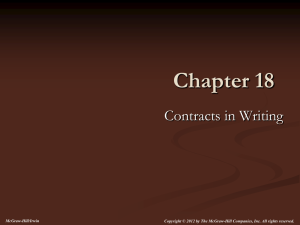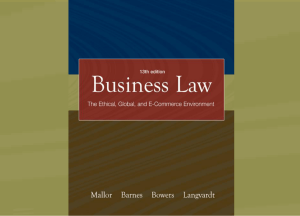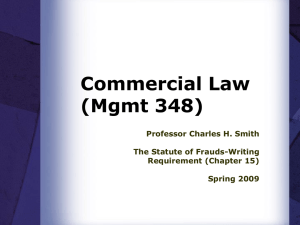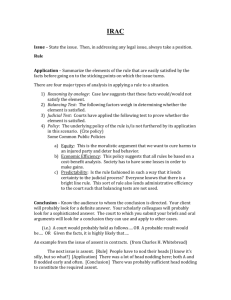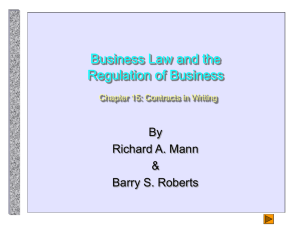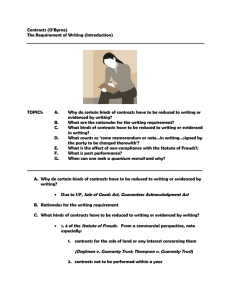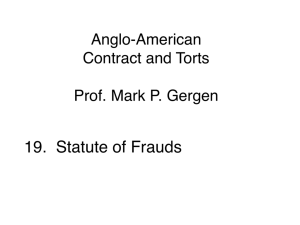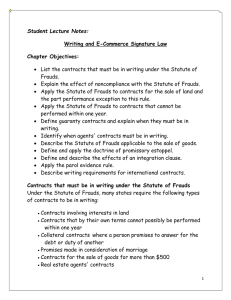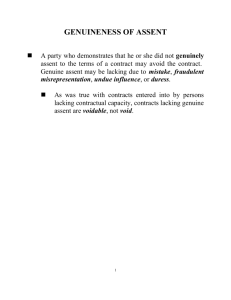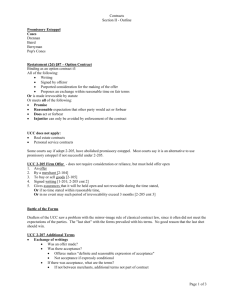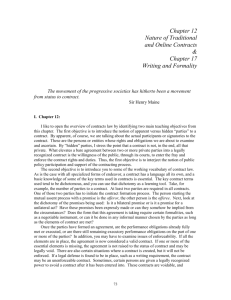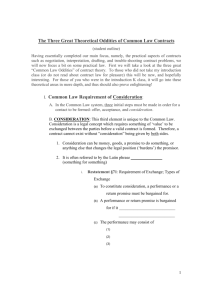ILLEGAL CONTRACTS
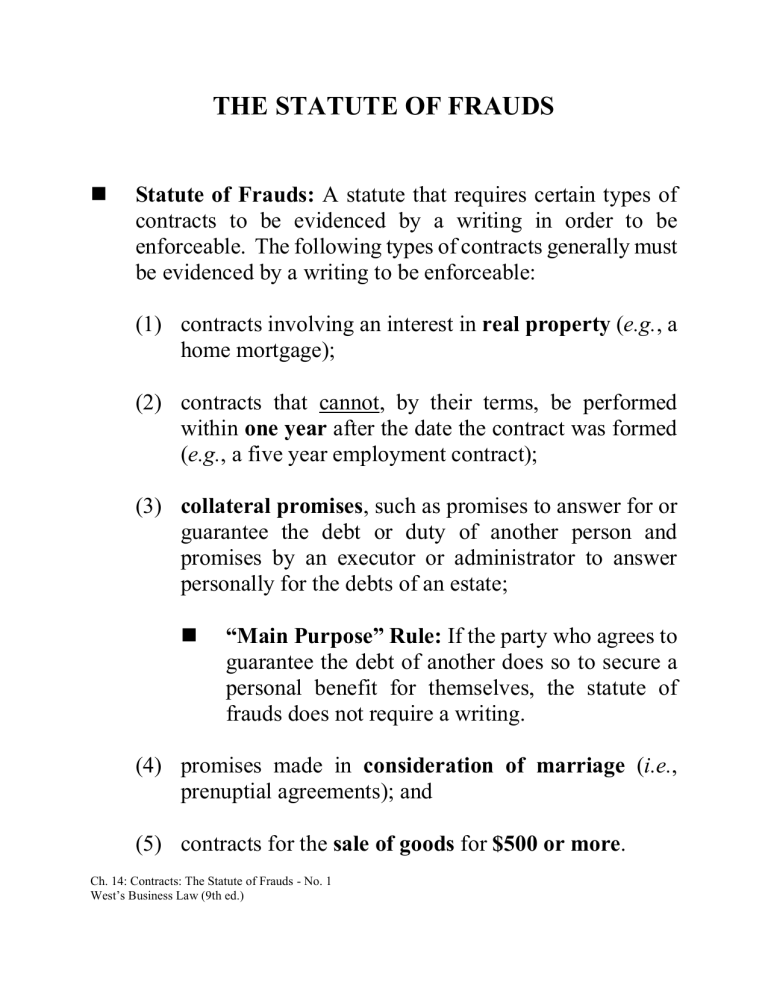
THE STATUTE OF FRAUDS
Statute of Frauds: A statute that requires certain types of contracts to be evidenced by a writing in order to be enforceable. The following types of contracts generally must be evidenced by a writing to be enforceable:
(1) contracts involving an interest in real property ( e.g.
, a home mortgage);
(2) contracts that cannot, by their terms, be performed within one year after the date the contract was formed
( e.g.
, a five year employment contract);
(3) collateral promises , such as promises to answer for or guarantee the debt or duty of another person and promises by an executor or administrator to answer personally for the debts of an estate;
“Main Purpose” Rule:
If the party who agrees to guarantee the debt of another does so to secure a personal benefit for themselves, the statute of frauds does not require a writing.
(4) promises made in consideration of marriage ( i.e.
, prenuptial agreements); and
(5) contracts for the sale of goods for $500 or more .
Ch. 14: Contracts: The Statute of Frauds - No. 1
West’s Business Law (9th ed.)
THE STATUTE OF FRAUDS: EXCEPTIONS
A contract that might otherwise be unenforceable because it is not evidenced by a writing may be enforced to some degree as follows:
Partial Performance: If a buyer has taken partial possession of property and paid that part of the contract price attributable to the property received, and if the parties cannot be returned to their pre-contractual positions, a court may order that the remainder of the contract be performed according to its terms.
Under the Uniform Commercial Code (“UCC”), an oral contract is enforceable to the extent that the seller has accepted payment or the buyer has accepted delivery of the goods covered by the oral contract.
Judicial Admission: If a party judicially admits the existence of a contract, the contract is enforceable at least to the extent of the admission.
Promissory Estoppel: If a promisor makes a promise on which the promisee justifiably relies to the promisee’s detriment, the promisor may be estopped from denying the existence and validity of the contract
Ch. 14: Contracts: The Statute of Frauds - No. 2
West’s Business Law (9th ed.)
despite the lack of a writing satisfying the statute of frauds.
Ch. 14: Contracts: The Statute of Frauds - No. 3
West’s Business Law (9th ed.)
FORM OF THE WRITING
A written contract , signed by both parties, satisfies the requirements of the statute of frauds. What else will suffice?
A writing signed by the party against whom enforcement is sought ;
An agreement may be signed anywhere on the agreement ; moreover, initials , letterhead , a rubber stamp , or even a fax banner may satisfy the signature requirement – as long as the person intended to authenticate the writing by affixing their initials, etc.
A confirmation , invoice , sales slip , check , or fax , or any combination thereof; or
Several documents which, in combination, provide the terms for an agreement.
Ch. 14: Contracts: The Statute of Frauds - No. 4
West’s Business Law (9th ed.)
ESSENTIAL TERMS
The writing need only contain the essential terms :
(1) the names of the parties,
(2) the subject matter of the contract,
(3) the amount of property to be sold or leased or services to be rendered, and
(4) the consideration given or promised to the party against whom enforcement is sought.
Whether price is an “essential” term depends on the type of contract in question.
Ch. 14: Contracts: The Statute of Frauds - No. 5
West’s Business Law (9th ed.)
THE PAROL EVIDENCE RULE
Parol Evidence Rule: A substantive rule of contract law under which a court will not admit evidence of the parties’ prior negotiations, prior oral or written agreements, or contemporaneous oral agreements if that evidence contradicts or varies the terms of a fully integrated, unambiguous written contract.
Integration: The extent to which a written contract represents the final and exclusive agreement of the parties.
A particular term included in a written contract is integrated if the writing represents the parties’ final agreement on that term.
A written contract is fully integrated if it constitutes the parties’ final agreement on all terms relating to the transaction.
Ambiguity: A written contract is unambiguous if its terms are not susceptible to more than one reasonable, legal interpretation.
Ch. 14: Contracts: The Statute of Frauds - No. 6
West’s Business Law (9th ed.)
PAROL EVIDENCE RULE: EXCEPTIONS
There are certain statutory exceptions that apply to contracts under the UCC. In addition, courts have recognized numerous exceptions to the operation of the parol evidence rule. Among the better-established exceptions are the following:
evidence of subsequent modification ;
evidence of mistake , fraud , or misrepresentation in the formation of the written contract;
evidence which may resolve an ambiguity or fill in a missing term or condition in the written contract;
evidence of prior dealing between the parties, usage of trade in the relevant locale or trade, and course of performance under the contract by the parties;
evidence of an oral condition precedent to the written contract; and
evidence of an obvious or gross clerical error .
Ch. 14: Contracts: The Statute of Frauds - No. 7
West’s Business Law (9th ed.)
